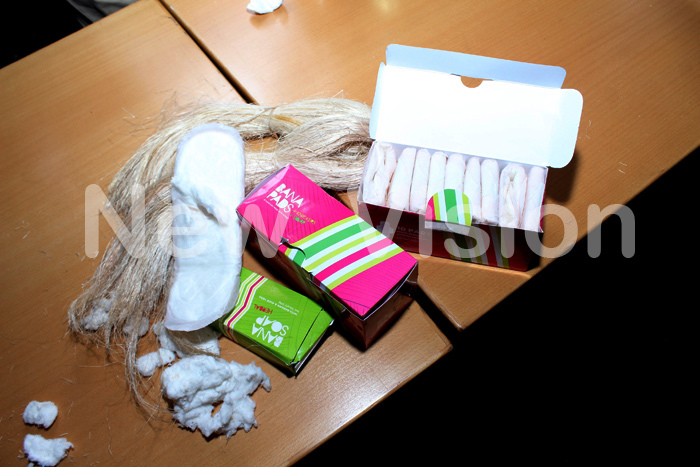Sweden supports spinners of trash into pads
The rural women who buy the pads and distribute them within their communities earn a commission of sh300 for each pack sold.
KAMPALA - The banana stem which has for long been considered as trash has become a raw material for making sanitary towels (pads). This could provide cheaper pads that could keep thousands of girls in school and also help rural women earn a living.
The breakthrough has been engineered by 34-year-old Richard Bbale, the Chief Executive Officer Bana Pads, a company that started in 2012 and is currently based in Mpigi District.
"I grew up in a village setting and saw how my sister struggled through school due to lack of sanitary towels. I never understood what she was going through. On certain occasions, she would use pieces of cloth during her monthly period or even miss school. When I enrolled for further studies, I picked the interest in making life easier for women," Bbale, a PHD graduate in Frugal Innovations from the University of Santa Clara, California, USA, said.
Bana Pads is one of the companies that benefited in the first phase of the funding provided by The Swedish International Development Agency (SIDA) for innovators with the aim of earning and at the same time eradicating poverty in various communities.
During a reception held at the Swedish residence in Kololo, the ambassador Urban Andersson announced that the second phase of the funding, dubbed 'Innovation Against Poverty' (IAP) that is slated for this year, will benefit another set of innovators from four countries, Uganda inclusive. Others include Ethiopia, Cambodia and Zambia.
Speaking at the event, Andersson said Uganda had the greatest number of projects supported during IAP phase 1 with 12 projects supported in total. He said Uganda's interest in innovation has since been proven through the level of participation in the first IAP round.
"Sweden's support to innovations that are being implemented in Uganda goes beyond the IAP beneficiaries to address several new frontiers using several funding modalities," the ambassador said, adding that the innovations to be supported will be under Agriculture, ICT, water and sanitation and energy.

Samples of the sanitary pads made from banana fibers. (Credit: Tony Rujuta)
Andersson said at a later date, announcements will be made for innovators to apply and win the grants.
Jenny Akerback, the senior programmes manager, SIDA said the grant worth Euros5m (sh18.8b) will help identify, support innovative businesses. She said persons eligible for the grant must have a registered company and a business idea that answers the call to poverty eradication.
She said each innovator will be awarded between Euros50, 000 to Euros200, 000 (sh188m-sh752m)
Explaining the Bana pads business modal at a mini expo that was held at the embassy, Jeremiah Kimbugwe the company's operations manager said the banana pseudo stem which is the main raw material, is scooped out and turned into thread. They then use a simple mechanism to get pulp (a porridge like substance) and have it dried to look like cotton. They then use aloe Vera to bleach the cotton like material and finish it with woven cloth. He said the pad decomposes when thrown away.
Every pack containing 10 pads costs sh1, 800. According to Kimbugwe, the rural women who buy the pads and distribute them within their communities earn a commission of sh300 for each pack sold hence creating livelihoods for them.
According to Kimbugwe, the product that is currently circulated with in Masaka, Mpigi and Rakai districts shall be rolled out to the mass market in Uganda in 2017.
Another innovation that benefited from the first funding phase was 'Safe boda', a social enterprise aimed at creating a commercially viable network of safe commuter motorbike (bodaboda) riders.
Their key safety intervention is the use of helmets, provision of rider training and behaviour change that is generated through financial incentives whereby SafeBoda riders attract more customers and increase their incomes by 50percent.